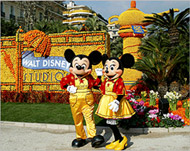Bucks battle free speech in US media
The decision by the Walt Disney Co to block distribution of filmmaker Michael Moore’s controversial new documentary, Fahrenheit 9/11, has cast new light on the growing influence of large corporations over the flow of information in the US.

At a time when the American public is still wrestling with politically sensitive questions about the 11 September 2001 attacks and the ongoing occupation of Iraq, Disney CEO Michael Eisner told ABC’s World News Tonight: “We just didn’t want to be in the middle of a politically oriented film during an election year.”
The documentary, according to news reports, takes a critical look at President Bush’s response to 9/11 and examines reported connections between the Bush family and the family of Usama bin Ladin.
Miramax Films, a Disney subsidiary, had planned to distribute the film. Disney’s decision to block distribution provoked criticism from several media organisations.
“The idea that Disney is declining to release the film because it is political does not bode very well for democratic debate in this country,” says Jim Naureckas, a spokesman for Fairness and Accuracy in Reporting (FAIR), a liberal watchdog group.
“We rely on companies like Disney to distribute information and entertainment in this country.”
Influences
 |
|
The reasons behind Disney’s bar |
Whether Disney’s aversion to the documentary was politically motivated is still unclear. The subject matter, however, likely contributed to its concerns, some media experts say.
“It almost goes without saying that if the film was championing President Bush and lauding his efforts on the war on terrorism, Disney would not have had a problem with it,” says Matthew Felling, media director for the Centre for Media and Public Affairs.
“But a film that criticises the president too much at a time of war proved to be too much for Disney to stomach.”
There are those, including Moore, who say money is the real reason behind Disney’s effort to prevent the film’s distribution.
Greenbacks
The outspoken director recently wrote on his website that Disney officials had expressed concern over the film’s potential impact on multi-million tax breaks related to Disney World, the company’s Florida theme park.
“Eisner told my agent that he did not want to anger Jeb Bush, the governor of Florida,” Moore said. “The movie, he believed, would complicate an already complicated situation with current and future Disney projects in Florida, and that many millions of dollars of tax breaks and incentives were at stake.”
|
“The movie would complicate an already complicated situation with current and future Disney projects in Florida, and that many millions of dollars of tax breaks and incentives were at stake” Michael Moore, |
Governor Bush issued a statement denying such tax breaks for Disney even existed.
Reports have also surfaced suggesting that Disney’s own connection to wealthy Saudi investors may have played a role in the decision. Prince al-Walid bin Talal, the grandson of King Fahd, owns a large stake in Disney’s Euro Disney theme park.
“There are reports in the press that Disney is looking for a fresh cash infusion from [al-Walid],” Naureckas says.
Corporate power
The controversy has raised additional questions about corporate control of the mainstream US news media.
All three major networks are owned by large companies whose financial interests tend to influence the news divisions, many media experts say. Disney owns ABC News, Viacom owns CBS and General Electric owns NBC.
There is an increasing belief among some media watchdog groups that the major news organisations are more profit-driven than ever before.
“Whereas journalism used to be thought of as a public trust, it is now a business,” Felling says.
While Disney’s business considerations clearly factored into its decision on Fahrenheit 9/11, they could have an impact on ABC News as well, some experts say.
Blurred boundaries
According to Felling, they already have. He cited a case in 1998 when the ABC news magazine show, 20/20, shelved an investigative report on acts of paedophilia allegedly committed by employees at one of Disney’s theme parks.
 |
|
General Electric, owner of NBC |
He also pointed to what he says is a serious conflict of interest: the fact that NBC’s parent company, General Electric, has been awarded large reconstruction contracts in Iraq.
“When [NBC] is reporting on the situation [of rebuilding Iraq], they are reporting on themselves,” he says.
At a time when major media companies have waged massive lobbying campaigns to persuade the Federal Communications Commission to change regulations limiting market share ownership, “the grip of commerce” on news reporting is tightening, Felling says.
Democratic Senator Frank Lautenberg considered the problem serious enough that he recently called for the Senate Committee on Commerce, Science and Transportation to hold hearings on the matter, in part, as a response to the controversy over Disney’s move to block the Moore film.
“This is a fundamental question of free speech in our society,” Lautenberg said in a statement.
“As our troops are overseas fighting to give the Iraqi people the very freedoms we enjoy, we see some of this country’s largest media conglomerates undermining our freedoms here.”